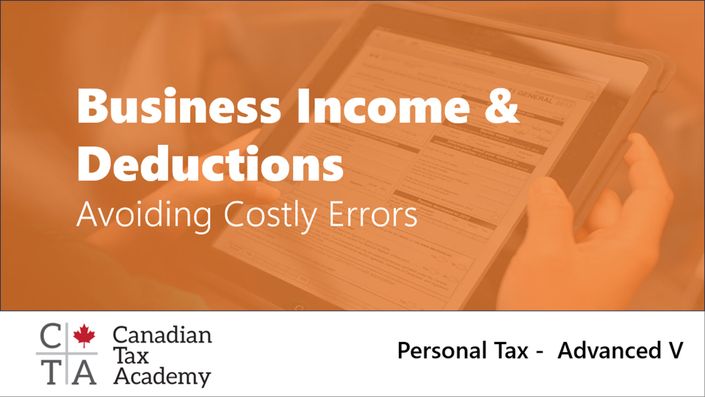
Personal Tax Handbook - Business Income & Deductions
Critical court cases on business concepts, partnership reporting, GST/HST spreadsheet tool and more
Watch Promo
Refund Policy: If you are unsatisfied with your purchase or if it is not what you were looking for, contact us in the first 14 days and we will give you a full refund, no questions asked.
The Personal Tax Handbook is a professional seminar series presented in a number of modules covering all aspects of T1 personal tax preparation. These seminars are intended for those of you who are looking into a career in tax preparation, or sole-practitioner or small firm.
Each course takes an in-depth deep dive into the most frequently encountered situations and frequently asked questions in personal tax preparation. The course methodology follows a two-stage teaching approach meant to give practitioners the tools required to file tax returns and advise clients on critical tax reporting and compliance matters. These two stages are:
1. Tax Preparation – In-depth preparation topics including tips, tricks and traps when dealing with those particular areas covered by the module. Best practices to avoid disputes with both clients and the CRA
2. Advisory & Problem Solving – A look at CRA policies and guidelines in each area along with relevant court cases that can be used by advisors and professionals to help guide them in their practice, advising clients and disputes with CRA.
All seminars in this series are update frequently with any changes, new or relevant court cases and CRA guidance. Once you purchase any module, you will have lifetime access to all updates – you are truly purchasing a module in a handbook, just in digital format.
Refund Policy on Seminars – Canadian Tax Academy offers a 14-day, 100% money-back guarantee on all seminars.
This module covers tax reporting and advisory in business income landscape. If you are thinking of a career as a tax practitioner, business income is the area where you will be expected to wear your “accountant’s hat” when dealing with client reporting and the CRA. If you are going to offering tax preparation services for business income clients, you will likely be on the radar map for CRA reviews and audits as well.
While this course centers on the T2125 and reporting business income, GST/HST reporting will also be examined. Our focus in the GST/HST realm will focus on issues frequently encountered by practitioners when filing business returns.
This seminar will cover a number of topics, including the following:
- Tips, trips and traps on reporting business income and filing the T2125. We will examine how something as simple as the Industry Code of your client’s business can have an impact on the likelihood of being selected for audit if T2125 numbers are not in line with what the CRA is expecting
- Nuances in reporting and claiming the CCA for vehicles. Do you know the differences between Class 10 and Class 10.1 vehicles? Is an SUV or van always a Class 10 vehicle? How about pickup trucks? If you choose the wrong class for your client’s vehicle, they can be in for a nasty reassessment if the CRA reviews automobile expenses and CCA claims (which they are starting to do more frequently).
- Understanding how GST/HST reporting ties in with business income and how improper or inconsistent reporting can lead to audits or large reassessments by the CRA
- Detailed overview of the Canada Pension Plan (CPP) and Employment Insurance (EI) programs as they relate to business income clients. CPP reporting changed a number of years back, but it is still a misunderstood area of tax especially for those clients between the ages of 60 and 70. Employment Insurance opt-in will be covered as well, along with important discussions you should be having with your clients regarding future EI issues.
- Reporting aspects of partnership income including claiming expenses to get the most tax benefit for all the partners. Ensuring that your client’s receive the GST/HST rebate for expenses they incur to earn partnership income. Also discussed is the partnership capital account which will likely become an issue in many partnership clients, especially if it is not being tracked
- One module is dedicated to the Platform Economy which has become an area of CRA focus. We will examine some of the most frequently asked questions from clients regarding GST/HST reporting and registration. Is there a difference between Uber drivers and Uber eats drivers? How does the $30,000 small supplier rule factor into GST/HST registration?
- Jurisprudence and relevant court cases will be examined to help in your advisory services to clients. Cases have been curated to help practitioners deal with the most frequently encountered reporting issues faced by clients. These cases can be put in your toolbox when dealing with CRA reviews and auditors.
- A practical excel spreadsheet file will be provided to help preparers file accurate business statements and the related GST/HST return. This time saving tool has been used by many practitioners to help navigate them through personal tax season.
Join us for this in-depth seminar and become more confident in dealing with business clients when preparing business statements and GST/HST returns.
Your Instructor

Ian DINovo is a professional accountant and Director of the Canadian Tax Academy. He has been practicing accounting and offering independent financial and business advice for over 20 years.
He is the creator of a number of courses dealing with business, tax and investment matters that are designed to make difficult topics easy to understand for everyone.
Course Curriculum
-
Start5.1.01 - Introduction to business income and the areas to look out for as a practitioner (6:41)
-
Start5.1.02 - Business income and GST/HST go hand in hand - Some common client misconceptions (4:31)
-
Start5.1.03 - Be mindful of cash businesses and ask yourself if the business statement makes sense (4:20)
-
Start5.1.04 - How to make the business statement more relevant & useful - Avoid CRA radar as a positive side-effect (6:57)
-
Start5.1.05 - The importance of the industry code and why the software keeps warning us to check it (6:36)
-
Start5.1.06 - An overview of two GST/HST reporting and avoiding business audit issues arising from HST returns (7:37)
-
Start5.1.07 - Overview of vehicle expense deductions and understanding Class 10 vs 10.1 vehicles (8:31)
-
Start5.1.08 - Nuances of Class 10.1 vehicles that result in reassessments on CRA review or audits (4:31)
-
Start5.1.09 - Business use of home office and ensuring the client is eligible for the claim (7:28)
-
Start5.2.01 - Overview of the CPP rules for self-employed between 60 and 70 (4:36)
-
Start5.2.02 - Completing Schedule 8 for those between 60 and 65 (8:42)
-
Start5.2.03 - EI for the self employed and opting into the system (4:48)
-
Start5.2.04 - Registration process for those who have opted in (2:43)
-
Start5.2.05 - Reporting EI premiums on the T1 return and payment of premiums (4:42)
-
Start5.2.06 - Some considerations when advising on CPP premiums and EI opt-in (5:48)
